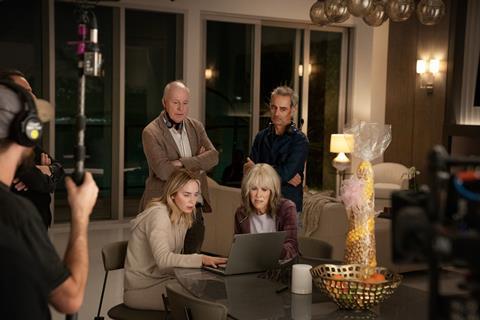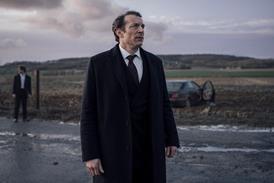Pain Hustlers sees director David Yates return to return to his roots after 15 years in JK Rowling’s Wizarding World with a story set against the US opioid crisis. “It’s got lots of humour but we still honour the seriousness of the subject,” he tells Screen.

After four Harry Potters, three Fantastic Beasts and one Tarzan, UK filmmaker David Yates was keen to get back to the type of work that saw him noticed by Hollywood in the first place.
“I was looking for something to do in America, a drama, just to get away from the greenscreens and fantasy world for a little bit,” says Yates, who made his name with gritty UK TV dramas such as State Of Play and Sex Traffic before becoming the go-to director for JK Rowling’s Wizarding World.
That something turned out to be a May 2018 New York Times Magazine article by Evan Hughes entitled ‘The Pain Hustlers’, which looked at the Insys Therapeutics sales team that earned millions selling painkillers until its scheme unravelled, resulting in a landmark criminal case. “What struck me more than anything was it was a world that felt completely different to our [UK] public health service, and a world in which anything goes,” says Yates. “I’ve always been fascinated by salespeople and the way they hustle and game the system. In particular, the people at the lower end of the ladder, at the grassroots of sales.”
Around the same time, screenwriter Wells Tower had been sent Hughes’ article and decided there was a film in it, as did producer Lawrence Grey (The Laundromat). The three men joined forces, setting up the project at Sony Pictures, with Yates producing via his Wychwood Media, and Grey through his Grey Matter Productions. “We developed the film with Sony for two or three years,” says Yates. “They basically let us get on with it.”
As Hughes expanded his article into a book called The Hard Sell, Towers worked in tandem on the script, although the results were markedly different. While the film Pain Hustlers is inspired by true events, Yates told Towers not to be constrained by the real people or situations. The film has its world premiere at TIFF on September 11 before Netflix gives it a one-week limited release from October 20, landing on the platform on October 27.
“We didn’t feel duty-bound to honour the exact detail,” says Yates. “The opioid crisis is bigger than that and more complex. We also wanted to make the film as entertaining and as inclusive as possible. The movie’s quite fun. It’s got lots of humour. It’s quite cheeky at times, it’s subversive. But we still honour the seriousness of the subject. I felt that was the best way to tackle something like this, rather than making an earnest, eat-your-vegetables drama.”
Character-driven

Moreover, Yates wanted to build his film around the character of a single mother, Liza, played by Emily Blunt, who takes a job at a struggling pharmaceutical firm and gets rich selling a fentanyl-based drug. “I was brought up by, effectively, a single mum,” the director says, “and I’ve always been looking for a story about a single mum, because I wanted to tell a story about someone who was undervalued, underappreciated, wasn’t highly educated, but was incredibly capable and was able to make a success of their life despite all the obstacles they faced.
“Really, it’s a story about the American dream, this wonderful myth that everyone can be a success,” he adds. “But at what cost? The rules are often fudged or bent when the rewards are high. We see it in the banking industry, and we see it in pharma.”
When Yates delivered Tower’s script to Sony, the studio baulked. “They got cold feet,” he says. “They decided a movie about the opioid crisis, taking that to the theatrical market, might not work.” Sony put Pain Hustlers into turnaround and Yates and Grey brought the project to market at Cannes 2022. “We had several offers and decided to go with Netflix.”
The budget, according to Yates, was $58m. Once Netflix came on board, he sent the script to Blunt. “She loved it. There are probably five actresses in Hollywood who could greenlight a movie at the budget that we had, and Emily was up there at the top of the list. She brought such passion and enthusiasm to that character, and completely understood the human being we were creating.”
Liza is a character who holds the audience’s sympathy throughout, despite the dark turns she takes. “That’s an extraordinary yoga pose, to hold the audience’s empathy when she’s starting to do slightly shady things,” says Yates. “That’s testament to Emily’s skills and her likeability as an actor, but also what Wells created.”
Blunt also joined as executive producer. “It was a genuine collaboration, she was always there for us to bounce things off,” continues Yates. “She was amazingly supportive and helpful, suggesting people we should meet and talk to. Lawrence and I would regularly share cuts with Emily for her thoughts and feedback. She has super-smart notes and a healthy perspective on everything — from the final draft of the script, through to the first cut of the film, through to some of the marketing we’re putting together.”
One of Blunt’s suggestions was to cast Catherine O’Hara as her mother. Another was to introduce Yates to music supervisor Ciara Elwis. “She had watched an Apple show [Bad Sisters], and said, ‘Have a listen, whoever put the music together for this is very special.’” Yates did and hired Elwis. “She was terrific. Emily’s got good taste.”
After spending the past 15 years working mostly on soundstages and the backlot of Warner Bros Studios Leavesden, northwest of London, Yates was thrilled to shoot Pain Hustlers on location in Miami and Atlanta. “I had never made a film in America, so it intrigued me working in an American landscape,” he says. “Before all those big Potter movies, my career was defined by moving fast, shooting fast, being on location, [making] very grounded, earthy dramas. With this, we were on, sometimes, two or three locations a day in Atlanta, shooting fast. It was a pleasure to go back to that, not waiting for the greenscreen or the puppet to come on.”
Not that Yates has any regrets about his time in the Wizarding World. Far from it. “I had a big train set, and I was working with people I liked,” he says. “Each film had its own challenges but it’s been a real pleasure to be in that world. I particularly enjoyed the last three I made, the three Beasts films. There’s something interesting about making a film when you know there’s an audience anticipating it. That’s an intoxicating place to be as a filmmaker. I looked at some of my colleagues, people I started out making films with, [and] they were all taking three or four years to get a film off the ground, and I was in this extraordinary place.”
Yates only put the finishing touches to Pain Hustlers a few weeks ago, and with the WGA and SAG-AFTRA strikes ongoing is looking forward to a period of rest and reflection. “I’ve got a few things bubbling away, but my priority now is to reflect and think exactly what should be next.”
That said, Yates feels Pain Hustlers represents the start of a new stage. “I feel I could divide my career into three. The first was that prolific TV period that got me on the radar of Hollywood, a diverse, intense period of a lot of good work that was very earthed and grounded. Then, I’ve done my Wizarding World, and it’s been a long time, probably too long, but I’ve enjoyed it. Now I feel I’m in the third act. I’ve got an opportunity to flex the muscles I’ve built across both those experiences.
“I know how to make a $200m movie with amazing visual effects, and I know how to make an earthy, social-realist drama,” he concludes. “In this third stage, I want to dance between both and utilise that skillset on good scripts. I’ve just got to find good scripts, and build good scripts, because that’s what it’s about.”

























No comments yet